#pyspark online
Explore tagged Tumblr posts
Text
How to Read and Write Data in PySpark
The Python application programming interface known as PySpark serves as the front end for Apache Spark execution of big data operations. The most crucial skill required for PySpark work involves accessing and writing data from sources which include CSV, JSON and Parquet files.
In this blog, you’ll learn how to:
Initialize a Spark session
Read data from various formats
Write data to different formats
See expected outputs for each operation
Let’s dive in step-by-step.
Getting Started
Before reading or writing, start by initializing a SparkSession.
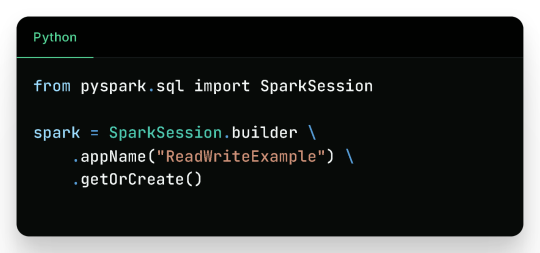
Reading Data in PySpark
1. Reading CSV Files

Sample CSV Data (sample.csv):

Output:

2. Reading JSON Files
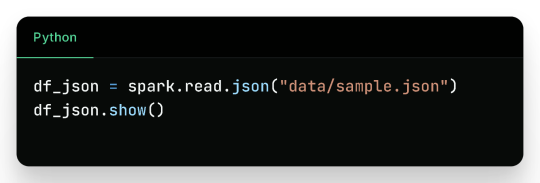
Sample JSON (sample.json):

Output:

3. Reading Parquet Files
Parquet is optimized for performance and often used in big data pipelines.

Assuming the parquet file has similar content:
Output:

4. Reading from a Database (JDBC)

Sample Table employees in MySQL:

Output:

Writing Data in PySpark
1. Writing to CSV
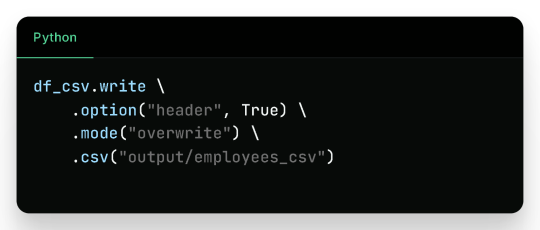
Output Files (folder output/employees_csv/):

Sample content:
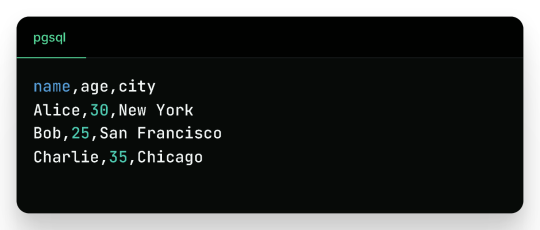
2. Writing to JSON

Sample JSON output (employees_json/part-*.json):
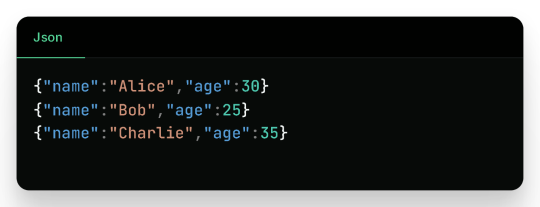
3. Writing to Parquet

Output:
Binary Parquet files saved inside output/employees_parquet/
You can verify the contents by reading it again:

4. Writing to a Database
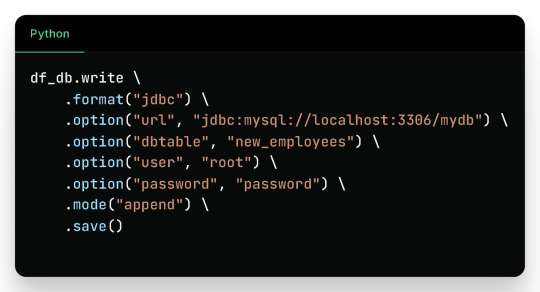
Check the new_employees table in your database — it should now include all the records.
Write Modes in PySpark
Mode
Description
overwrite
Overwrites existing data
append
Appends to existing data
ignore
Ignores if the output already exists
error
(default) Fails if data exists
Real-Life Use Case
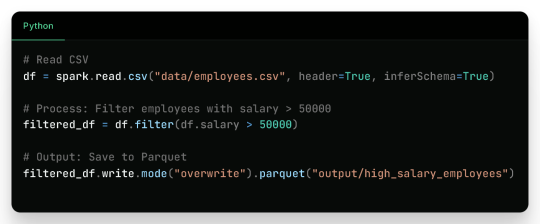
Filtered Output:
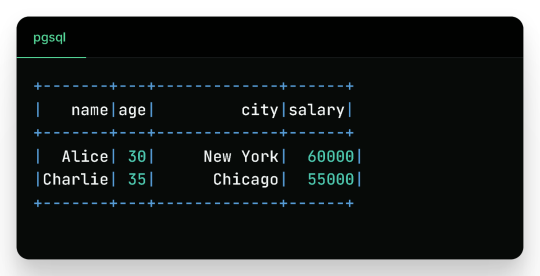
Wrap-Up
Reading and writing data in PySpark is efficient, scalable, and easy once you understand the syntax and options. This blog covered:
Reading from CSV, JSON, Parquet, and JDBC
Writing to CSV, JSON, Parquet, and back to Databases
Example outputs for every format
Best practices for production use
Keep experimenting and building real-world data pipelines — and you’ll be a PySpark pro in no time!
🚀Enroll Now: https://www.accentfuture.com/enquiry-form/
���Call Us: +91-9640001789
📧Email Us: [email protected]
🌍Visit Us: AccentFuture
#apache pyspark training#best pyspark course#best pyspark training#pyspark course online#pyspark online classes#pyspark training#pyspark training online
0 notes
Text
PySpark Interview Questions and Answers (2025) - Tpoint Tech
"PySpark Interview Questions and Answers" is a comprehensive guide designed to help candidates prepare for interviews involving Apache Spark's Python API. It covers key concepts, including RDDs, DataFrames, transformations, actions, and performance optimization. The guide provides practical answers, ensuring candidates are ready for both theoretical and hands-on questions.
0 notes
Text
Master PySpark for High-Speed Data Processing Online!
youtube
0 notes
Text
Python Training institute in Hyderabad
Best Python Training in Hyderabad by RS Trainings
Python is one of the most popular and versatile programming languages in the world, renowned for its simplicity, readability, and broad applicability across various domains like web development, data science, artificial intelligence, and more. If you're looking to learn Python or enhance your Python skills, RS Trainings offers the best Python training in Hyderabad, guided by industry IT experts. Recognized as the best place for better learning, RS Trainings is committed to delivering top-notch education that equips you with practical skills and knowledge.

Why Choose RS Trainings for Python?
1. Expert Instructors: Our Python training program is led by seasoned industry professionals who bring a wealth of experience and insights. They are adept at simplifying complex concepts and providing real-world examples to ensure you gain a deep understanding of Python.
2. Comprehensive Curriculum: The curriculum is meticulously designed to cover everything from the basics of Python to advanced topics. You'll learn about variables, data types, control structures, functions, modules, file handling, object-oriented programming, web development frameworks like Django and Flask, and data analysis libraries like Pandas and NumPy.
3. Hands-on Learning: We emphasize a practical approach to learning. Our training includes numerous hands-on exercises, coding assignments, and real-time projects that help you apply the concepts you learn in class, ensuring you gain practical experience.
4. Flexible Learning Options: RS Trainings offers both classroom and online training options to accommodate different learning preferences and schedules. Whether you are a working professional or a student, you can find a batch that fits your timetable.
5. Career Support: Beyond just training, we provide comprehensive career support, including resume building, interview preparation, and job placement assistance. Our aim is to help you smoothly transition into a successful career in Python programming.
Course Highlights:
Introduction to Python: Get an overview of Python and its applications, understanding why it is a preferred language for various domains.
Core Python Concepts: Dive into the core concepts, including variables, data types, control structures, loops, and functions.
Object-Oriented Programming: Learn about object-oriented programming in Python, covering classes, objects, inheritance, and polymorphism.
Web Development: Explore web development using popular frameworks like Django and Flask, and build your own web applications.
Data Analysis: Gain proficiency in data analysis using libraries like Pandas, NumPy, and Matplotlib.
Real-world Projects: Work on real-world projects that simulate industry scenarios, enhancing your practical skills and understanding.
Who Should Enroll?
Aspiring Programmers: Individuals looking to start a career in programming.
Software Developers: Developers wanting to add Python to their skill set.
Data Scientists and Analysts: Professionals aiming to leverage Python for data analysis and machine learning.
Web Developers: Web developers interested in using Python for backend development.
Students and Enthusiasts: Anyone with a passion for learning programming and Python.
Enroll Today!
Join RS Trainings, the best Python training institute in Hyderabad, and embark on a journey to master one of the most powerful programming languages. Our expert-led training, practical approach, and comprehensive support ensure you are well-prepared to excel in your career.
Visit our website or contact us to learn more about our Python training program, upcoming batches, and enrollment details. Elevate your programming skills with RS Trainings – the best place for better learning in Hyderabad!
#python training#python online training#python training in Hyderabad#python training institute in Hyderabad#python course online Hyderabad#pyspark course online
0 notes
Text
From Beginner to Pro: The Best PySpark Courses Online from ScholarNest Technologies

Are you ready to embark on a journey from a PySpark novice to a seasoned pro? Look no further! ScholarNest Technologies brings you a comprehensive array of PySpark courses designed to cater to every skill level. Let's delve into the key aspects that make these courses stand out:
1. What is PySpark?
Gain a fundamental understanding of PySpark, the powerful Python library for Apache Spark. Uncover the architecture and explore its diverse applications in the world of big data.
2. Learning PySpark by Example:
Experience is the best teacher! Our courses focus on hands-on examples, allowing you to apply your theoretical knowledge to real-world scenarios. Learn by doing and enhance your problem-solving skills.
3. PySpark Certification:
Elevate your career with our PySpark certification programs. Validate your expertise and showcase your proficiency in handling big data tasks using PySpark.
4. Structured Learning Paths:
Whether you're a beginner or seeking advanced concepts, our courses offer structured learning paths. Progress at your own pace, mastering each skill before moving on to the next level.
5. Specialization in Big Data Engineering:
Our certification course on big data engineering with PySpark provides in-depth insights into the intricacies of handling vast datasets. Acquire the skills needed for a successful career in big data.
6. Integration with Databricks:
Explore the integration of PySpark with Databricks, a cloud-based big data platform. Understand how these technologies synergize to provide scalable and efficient solutions.
7. Expert Instruction:
Learn from the best! Our courses are crafted by top-rated data science instructors, ensuring that you receive expert guidance throughout your learning journey.
8. Online Convenience:
Enroll in our online PySpark courses and access a wealth of knowledge from the comfort of your home. Flexible schedules and convenient online platforms make learning a breeze.
Whether you're a data science enthusiast, a budding analyst, or an experienced professional looking to upskill, ScholarNest's PySpark courses offer a pathway to success. Master the skills, earn certifications, and unlock new opportunities in the world of big data engineering!
#big data#data engineering#data engineering certification#data engineering course#databricks data engineer certification#pyspark course#databricks courses online#best pyspark course online#pyspark online course#databricks learning#data engineering courses in bangalore#data engineering courses in india#azure databricks learning#pyspark training course#pyspark certification course
1 note
·
View note
Text
Big Data Analytics: Tools & Career Paths

In this digital era, data is being generated at an unimaginable speed. Social media interactions, online transactions, sensor readings, scientific inquiries-all contribute to an extremely high volume, velocity, and variety of information, synonymously referred to as Big Data. Impossible is a term that does not exist; then, how can we say that we have immense data that remains useless? It is where Big Data Analytics transforms huge volumes of unstructured and semi-structured data into actionable insights that spur decision-making processes, innovation, and growth.
It is roughly implied that Big Data Analytics should remain within the triangle of skills as a widely considered niche; in contrast, nowadays, it amounts to a must-have capability for any working professional across tech and business landscapes, leading to numerous career opportunities.
What Exactly Is Big Data Analytics?
This is the process of examining huge, varied data sets to uncover hidden patterns, customer preferences, market trends, and other useful information. The aim is to enable organizations to make better business decisions. It is different from regular data processing because it uses special tools and techniques that Big Data requires to confront the three Vs:
Volume: Masses of data.
Velocity: Data at high speed of generation and processing.
Variety: From diverse sources and in varying formats (!structured, semi-structured, unstructured).
Key Tools in Big Data Analytics
Having the skills to work with the right tools becomes imperative in mastering Big Data. Here are some of the most famous ones:
Hadoop Ecosystem: The core layer is an open-source framework for storing and processing large datasets across clusters of computers. Key components include:
HDFS (Hadoop Distributed File System): For storing data.
MapReduce: For processing data.
YARN: For resource-management purposes.
Hive, Pig, Sqoop: Higher-level data warehousing and transfer.
Apache Spark: Quite powerful and flexible open-source analytics engine for big data processing. It is much faster than MapReduce, especially for iterative algorithms, hence its popularity in real-time analytics, machine learning, and stream processing. Languages: Scala, Python (PySpark), Java, R.
NoSQL Databases: In contrast to traditional relational databases, NoSQL (Not only SQL) databases are structured to maintain unstructured and semic-structured data at scale. Examples include:
MongoDB: Document-oriented (e.g., for JSON-like data).
Cassandra: Column-oriented (e.g., for high-volume writes).
Neo4j: Graph DB (e.g., for data heavy with relationships).
Data Warehousing & ETL Tools: Tools for extracting, transforming, and loading (ETL) data from various sources into a data warehouse for analysis. Examples: Talend, Informatica. Cloud-based solutions such as AWS Redshift, Google BigQuery, and Azure Synapse Analytics are also greatly used.
Data Visualization Tools: Essential for presenting complex Big Data insights in an understandable and actionable format. Tools like Tableau, Power BI, and Qlik Sense are widely used for creating dashboards and reports.
Programming Languages: Python and R are the dominant languages for data manipulation, statistical analysis, and integrating with Big Data tools. Python's extensive libraries (Pandas, NumPy, Scikit-learn) make it particularly versatile.
Promising Career Paths in Big Data Analytics
As Big Data professionals in India was fast evolving, there were diverse professional roles that were offered with handsome perks:
Big Data Engineer: Designs, builds, and maintains the large-scale data processing systems and infrastructure.
Big Data Analyst: Work on big datasets, finding trends, patterns, and insights that big decisions can be made on.
Data Scientist: Utilize statistics, programming, and domain expertise to create predictive models and glean deep insights from data.
Machine Learning Engineer: Concentrates on the deployment and development of machine learning models on Big Data platforms.
Data Architect: Designs the entire data environment and strategy of an organization.
Launch Your Big Data Analytics Career
Some more Specialized Big Data Analytics course should be taken if you feel very much attracted to data and what it can do. Hence, many computer training institutes in Ahmedabad offer comprehensive courses covering these tools and concepts of Big Data Analytics, usually as a part of Data Science with Python or special training in AI and Machine Learning. Try to find those courses that offer real-time experience and projects along with industry mentoring, so as to help you compete for these much-demanded jobs.
When you are thoroughly trained in the Big Data Analytics tools and concepts, you can manipulate information for innovation and can be highly paid in the working future.
At TCCI, we don't just teach computers — we build careers. Join us and take the first step toward a brighter future.
Location: Bopal & Iskcon-Ambli in Ahmedabad, Gujarat
Call now on +91 9825618292
Visit Our Website: http://tccicomputercoaching.com/
0 notes
Text
Transform Your Team into Data Engineering Pros with ScholarNest Technologies

In the fast-evolving landscape of data engineering, the ability to transform your team into proficient professionals is a strategic imperative. ScholarNest Technologies stands at the forefront of this transformation, offering comprehensive programs that equip individuals with the skills and certifications necessary to excel in the dynamic field of data engineering. Let's delve into the world of data engineering excellence and understand how ScholarNest is shaping the data engineers of tomorrow.
Empowering Through Education: The Essence of Data Engineering
Data engineering is the backbone of current data-driven enterprises. It involves the collection, processing, and storage of data in a way that facilitates effective analysis and insights. ScholarNest Technologies recognizes the pivotal role data engineering plays in today's technological landscape and has curated a range of courses and certifications to empower individuals in mastering this discipline.
Comprehensive Courses and Certifications: ScholarNest's Commitment to Excellence
1. Data Engineering Courses: ScholarNest offers comprehensive data engineering courses designed to provide a deep understanding of the principles, tools, and technologies essential for effective data processing. These courses cover a spectrum of topics, including data modeling, ETL (Extract, Transform, Load) processes, and database management.
2. Pyspark Mastery: Pyspark, a powerful data processing library for Python, is a key component of modern data engineering. ScholarNest's Pyspark courses, including options for beginners and full courses, ensure participants acquire proficiency in leveraging this tool for scalable and efficient data processing.
3. Databricks Learning: Databricks, with its unified analytics platform, is integral to modern data engineering workflows. ScholarNest provides specialized courses on Databricks learning, enabling individuals to harness the full potential of this platform for advanced analytics and data science.
4. Azure Databricks Training: Recognizing the industry shift towards cloud-based solutions, ScholarNest offers courses focused on Azure Databricks. This training equips participants with the skills to leverage Databricks in the Azure cloud environment, ensuring they are well-versed in cutting-edge technologies.
From Novice to Expert: ScholarNest's Approach to Learning
Whether you're a novice looking to learn the fundamentals or an experienced professional seeking advanced certifications, ScholarNest caters to diverse learning needs. Courses such as "Learn Databricks from Scratch" and "Machine Learning with Pyspark" provide a structured pathway for individuals at different stages of their data engineering journey.
Hands-On Learning and Certification: ScholarNest places a strong emphasis on hands-on learning. Courses include practical exercises, real-world projects, and assessments to ensure that participants not only grasp theoretical concepts but also gain practical proficiency. Additionally, certifications such as the Databricks Data Engineer Certification validate the skills acquired during the training.
The ScholarNest Advantage: Shaping Data Engineering Professionals
ScholarNest Technologies goes beyond traditional education paradigms, offering a transformative learning experience that prepares individuals for the challenges and opportunities in the world of data engineering. By providing access to the best Pyspark and Databricks courses online, ScholarNest is committed to fostering a community of skilled data engineering professionals who will drive innovation and excellence in the ever-evolving data landscape. Join ScholarNest on the journey to unlock the full potential of your team in the realm of data engineering.
#big data#big data consulting#data engineering#data engineering course#data engineering certification#databricks data engineer certification#pyspark course#databricks courses online#best pyspark course online#best pyspark course#pyspark online course#databricks learning#data engineering courses in bangalore#data engineering courses in india#azure databricks learning#pyspark training course
1 note
·
View note
Text
PySpark Online Training | Learn Apache Spark at AccentFuture

Looking to master PySpark? Join AccentFuture's PySpark online training and gain hands-on experience with Apache Spark, Hadoop Spark, and big data processing. Our expert-led PySpark course covers everything from Spark fundamentals to real-time data processing. Get Apache Spark certification and boost your career in big data analytics. Enroll now!
0 notes
Text
How should I start learning Python?
Good Choice! Python is a fabulous language for Data Science, since it is very readable, versatile, and features a great many libraries.
1. Mastering the Basics of Python
First of all, learn the basics: one needs to study Variables, Data Types — numbers, strings, lists, dictionaries, Operators, Control Flow — if-else, loops, functions
Practice consistently: Learning to code is like learning a language. One has to keep practicing.
Online Resources: One can study through online platforms like Codecademy, Coursera, Lejhro, or watch YouTube Tutorials to learn in a structured format.
2. Dive into Data Structures and Algorithms
Master data structures: Know in detail about lists, tuples, sets, and dictionaries.
Understand algorithms: Know about sorting, searching, and other basic algorithms.
Problem solving: Practice problems or coding challenges on LeetCode or HackerRank.
3. Explore Data Analysis Libraries
NumPy: Introduce yourself to array manipulation, mathematical operations on arrays, and random number generation.
Pandas: Learn data manipulation, cleaning, analysis of DataFrames.
Matplotlib: Visualize your data elegantly with a variety of plot types.
Seaborn: Beautiful visualizations with a high-level interface.
4. Dive into Machine Learning
Scikit-learn: The study of supervised and unsupervised learning algorithms.
How to evaluate a model: metrics, cross-validation, hyperparameter tuning.
Practice on datasets: Solve real-world problems and build up your portfolio.
5. Deep Dive into Data Science
Statistics: probability theory, distributions, hypothesis testing, regression
Big data tools: Be familiar with PySpark for large datasets.
Data Engineering: Data pipelines, ETL processes, cloud platforms
Additional Tips
Join online communities: Participate in forums, discussions, and projects to learn from others.
Build projects: Apply the skill by making a data science project of your own.
Keep learning: The field is very dynamic; hence, keep updating your skills.
Remember
Start small: Break down complex topics into smaller, manageable chunks.
Practice consistently: To get good at coding, one needs to code regularly.
Don't be afraid to experiment: Try different approaches, learn from failures.
Look into leveraging some of the free and paid-for online resources that are available.
0 notes
Text
Exploring Advanced Python Projects for Experienced Developers
For seasoned Python developers, continuously challenging oneself with complex projects is crucial for growth and skill enhancement. Here are some advanced Python project ideas that can significantly boost your expertise and broaden your programming horizons. Considering the kind support of Learn Python Course in Pune, Whatever your level of experience or reason for switching from another programming language, learning Python gets much more fun.

1. Machine Learning Innovations
Recommendation Engines
Dive into building a recommendation system using collaborative filtering or content-based filtering. This can be applied to various domains like movie suggestions, product recommendations, or even personalized content curation.
Advanced Natural Language Processing (NLP)
Engage in projects involving sentiment analysis, text summarization, or language translation using libraries such as NLTK, SpaCy, or TensorFlow. These projects will deepen your understanding of NLP and its applications.
Predictive Analytics
Develop predictive models using scikit-learn or TensorFlow to forecast stock prices, weather patterns, or sports results. These projects can help you master the art of predictive analytics and data handling.
2. Web Development Mastery with Django or Flask
Comprehensive E-commerce Platforms
Design and implement a robust e-commerce website featuring user authentication, product listings, shopping cart functionality, and payment processing. This will provide you with invaluable experience in web development and management.
Social Networking Applications
Create a social media platform complete with user profiles, posts, comments, and likes. Incorporate real-time updates using WebSockets to enhance user interaction and engagement.
3. Data Science and Analytical Projects
Big Data Handling
Utilize PySpark or Dask to manage and analyze large datasets. Potential projects include processing log files, analyzing social media data, or performing large-scale data aggregation to draw meaningful insights.
Interactive Data Visualization
Develop interactive dashboards using Plotly Dash or Bokeh to visualize complex datasets. These could include financial data, demographic information, or scientific research, providing insightful and engaging visual representations.
4. Automation and Scripting Challenges
Advanced Web Scraping
Create sophisticated web scrapers using BeautifulSoup, Scrapy, or Selenium to extract data from complex websites. Projects could include a price tracker, job aggregator, or research data collection tool.
Workflow Automation
Design scripts to automate repetitive tasks like file organization, email automation, or system monitoring and reporting. This can significantly enhance productivity and efficiency. Enrolling in the Best Python Certification Online can help people realise Python’s full potential and gain a deeper understanding of its complexities.
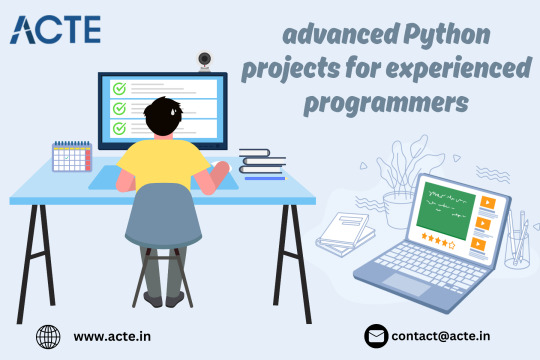
5. Blockchain and Cryptographic Projects
Blockchain Fundamentals
Implement a basic blockchain and simulate transactions, mining, and peer-to-peer networking. Explore creating smart contracts using Ethereum and Solidity to grasp the essentials of blockchain technology.
Cryptographic Systems
Develop and implement cryptographic algorithms like RSA, AES, or hashing techniques. Create secure messaging applications or file encryption tools to delve into cybersecurity.
6. Game Development Ventures
Game AI Development
Develop AI that can play classic games like Chess, Go, or Poker using algorithms such as Minimax, Alpha-Beta Pruning, or Monte Carlo Tree Search. This project will challenge your strategic thinking and AI programming skills.
3D Game Creation
Use a game engine like Pygame or Godot to build a 3D game. Integrate complex physics, graphics, and AI behaviors to create a rich and immersive gaming experience.
7. Internet of Things (IoT) Projects
Smart Home Automation
Construct an IoT-based home automation system using Raspberry Pi or Arduino. Integrate sensors and actuators, and create a web or mobile interface to control home appliances, enhancing convenience and efficiency.
Health Monitoring Systems
Develop a health monitoring system that collects data from wearable devices, processes it, and provides health insights and alerts. This project can have a significant impact on health and wellness.
8. Cybersecurity Development
Penetration Testing Tools
Create tools for network scanning, vulnerability assessment, or exploit development. Projects could include building a custom port scanner, brute-force attack tool, or network traffic analyzer.
Intrusion Detection Systems
Develop an intrusion detection system using machine learning to analyze network traffic and detect suspicious activities or anomalies. This will help you understand and implement advanced network security measures.
Conclusion
Engaging in advanced Python projects can push the boundaries of your programming abilities and introduce you to new technological domains. Each project offers an opportunity to deepen your understanding of complex concepts, experiment with new libraries and frameworks, and build a robust portfolio showcasing your skills. Whether you focus on machine learning, web development, data science, or cybersecurity, these projects provide valuable experience and pave the way for new career opportunities.
#python course#python training#python#technology#tech#python programming#python online training#python online course#python online classes
0 notes
Text
Mastering Big Data Tools: Scholarnest's Databricks Cloud Training

In the ever-evolving landscape of data engineering, mastering the right tools is paramount for professionals seeking to stay ahead. Scholarnest, a leading edtech platform, offers comprehensive Databricks Cloud training designed to empower individuals with the skills needed to navigate the complexities of big data. Let's explore how this training program, rich in keywords such as data engineering, Databricks, and PySpark, sets the stage for a transformative learning journey.
Diving into Data Engineering Mastery:
Data Engineering Course and Certification:
Scholarnest's Databricks Cloud training is structured as a comprehensive data engineering course. The curriculum is curated to cover the breadth and depth of data engineering concepts, ensuring participants gain a robust understanding of the field. Upon completion, learners receive a coveted data engineer certification, validating their expertise in handling big data challenges.
Databricks Data Engineer Certification:
The program places a special emphasis on Databricks, a leading big data analytics platform. Participants have the opportunity to earn the Databricks Data Engineer Certification, a recognition that holds substantial value in the industry. This certification signifies proficiency in leveraging Databricks for efficient data processing, analytics, and machine learning.
PySpark Excellence Unleashed:
Best PySpark Course Online:
A highlight of Scholarnest's offering is its distinction as the best PySpark course online. PySpark, the Python library for Apache Spark, is a pivotal tool in the data engineering arsenal. The course delves into PySpark's intricacies, enabling participants to harness its capabilities for data manipulation, analysis, and processing at scale.
PySpark Training Course:
The PySpark training course is thoughtfully crafted to cater to various skill levels, including beginners and those looking for a comprehensive, full-course experience. The hands-on nature of the training ensures that participants not only grasp theoretical concepts but also gain practical proficiency in PySpark.
Azure Databricks Learning for Real-World Applications:
Azure Databricks Learning:
Recognizing the industry's shift towards cloud-based solutions, Scholarnest's program includes Azure Databricks learning. This module equips participants with the skills to leverage Databricks in the Azure cloud environment, aligning their knowledge with contemporary data engineering practices.
Best Databricks Courses:
Scholarnest stands out for offering one of the best Databricks courses available. The curriculum is designed to cover the entire spectrum of Databricks functionalities, from data exploration and visualization to advanced analytics and machine learning.
Learning Beyond Limits:
Self-Paced Training and Certification:
The flexibility of self-paced training is a cornerstone of Scholarnest's approach. Participants can learn at their own speed, ensuring a thorough understanding of each concept before progressing. The self-paced model is complemented by comprehensive certification, validating the mastery of Databricks and related tools.
Machine Learning with PySpark:
Machine learning is seamlessly integrated into the program, providing participants with insights into leveraging PySpark for machine learning applications. This inclusion reflects the program's commitment to preparing professionals for the holistic demands of contemporary data engineering roles.
Conclusion:
Scholarnest's Databricks Cloud training transcends traditional learning models. By combining in-depth coverage of data engineering principles, hands-on PySpark training, and Azure Databricks learning, this program equips participants with the knowledge and skills needed to excel in the dynamic field of big data. As the industry continues to evolve, Scholarnest remains at the forefront, ensuring that professionals are not just keeping pace but leading the way in data engineering excellence.
#data engineering#data engineering course#data engineering certification#databricks data engineer certification#pyspark course#databricks courses online#best pyspark course online#best pyspark course#pyspark online course#databricks learning#data engineering courses in bangalore#data engineering courses in india#azure databricks learning#pyspark training course#big data
1 note
·
View note
Text
The Python Advantage: Unleashing the Full Potential of Data Science
In the ever-evolving landscape of data science, the choice of programming language can make all the difference. While various tools and technologies have emerged, one language has consistently stood out as a favorite among data professionals: Python. With its unparalleled versatility, extensive library support, and active community, Python has become the go-to solution for unlocking the full potential of data science.
One of the best things about the data science course in Coimbatore is that it has a team of experienced faculty members who are always ready to help students. So if you are looking for a place to learn machine learning, choose the right choice.

The Data Science Powerhouse
Python's rise to prominence in the data science realm can be attributed to its robust set of features and capabilities. From machine learning and predictive modeling to big data management and natural language processing, Python's versatility knows no bounds.
Mastering the Machine Learning Frontier
At the forefront of data science lies the realm of machine learning, where Python's libraries, such as scikit-learn, TensorFlow, and Keras, have revolutionized the field. Data scientists can now build and deploy sophisticated predictive models with remarkable ease, tackling a wide range of problems, from customer churn prediction to fraud detection.
Navigating the Big Data Landscape
As the volume of data continues to grow exponentially, Python's PySpark and other big data tools have become indispensable for processing, storing, and analyzing large-scale datasets. Data scientists can now wrangle and extract insights from massive amounts of information, powering data-driven decision-making.
Unlocking the Power of Business Analytics
Python's data manipulation and visualization capabilities, enabled by libraries like Pandas and Matplotlib, have made it a go-to choice for business analysts. From generating insightful reports to creating dynamic dashboards, Python empowers data scientists to uncover valuable insights and drive data-informed strategies.

The data science institute in Coimbatore offers the data science online courses to enable students to become expert practitioners: The course aims at providing the student with the knowledge necessary for their career as Data scientists.
Exploring the Frontiers of Natural Language Processing
The natural language processing domain has seen a significant boost with Python's libraries like NLTK and spaCy. Data scientists can now tackle complex text-based tasks, such as sentiment analysis, topic modeling, and language translation, opening up a world of possibilities in areas like customer service, content analysis, and social media monitoring.
Advancing Scientific Computing with Python
Python's strong foundation in scientific computing, thanks to libraries like NumPy, SciPy, and Pandas, has made it a preferred choice for researchers, scientists, and data analysts across various disciplines. Whether it's complex mathematical calculations, statistical analysis, or simulation modeling, Python provides the necessary tools to drive scientific discoveries and advancements.
Embracing the Future with Python
The scope of data science with Python is truly boundless. As the demand for data-driven insights continues to grow, Python's versatility, extensive library support, and active community make it an invaluable asset for data scientists, empowering them to tackle a wide range of challenges and unlock the full potential of data.
The scope of data science with Python is truly limitless. As the need for data-driven insights expands, Python's flexibility, extensive library ecosystem, and vibrant community make it an essential tool for data scientists. It empowers them to address diverse challenges and fully harness the power of data.
0 notes
Text
"The Fast and Furious: Exploring the Rapid Growth of Python in the Programming World"
The fastest growing and the most popular programming language in today’s programming world is Python. The word time, the word "Python" evoked images of a massive snake, but today, it's synonymous with a wildly popular programming language. According to the TIOBE Index, Python holds the prestigious position of being the fourth most popular programming language globally, and its meteoric rise shows no signs of slowing.

Python’s and Growing User Base:
Several factors contribute to Python's remarkable success. First and foremost is its widespread adoption in web development. Renowned companies such as Google, Facebook, Mozilla, Quora, and many others employ Python web frameworks, elevating its prominence in this domain. Another pivotal driver behind Python's rapid growth is its pivotal role in the realm of data science.
Another factor that takes Python to the next level programming language is its easy use in Data Science. Therefore, the language is steadily growing in demand in the last ten years. In 2018, it was found in a survey that the majority of developers are obtaining training for the language and started work as Python developers. Initially, Python was built to solve the code readability issues discovered in C and Java languages.
The Reason Behind the Popularity of Pythons:
●As per the record, the reason behind the demand for python is it is easy to use. The language is pretty simple and can be easily readable. The simplicity of the language makes Python a favorite programming language among developers. Moreover, Python is an efficient language.
●Today almost all the developers and big tech giants prefer Python for web development. Some famous web frameworks can be utilized for web development project requirements.
●Even high-level Python is being trained as coursework. So that student can get prepared for the upcoming pythons’ trends and achieve success in their careers.
Python's skyrocketing popularity and its path towards becoming the world's most popular programming language are indeed remarkable phenomena.
Several Key Factors Underpin This Incredible Rise:
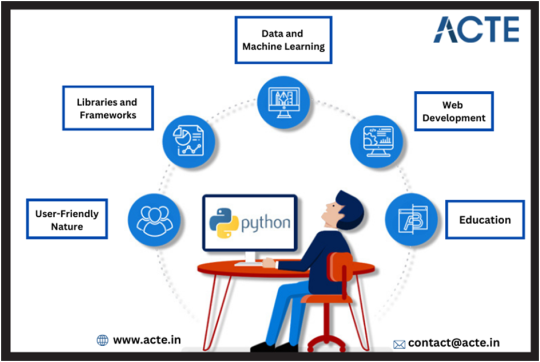
Python's User-Friendly Nature: Python stands out for its user-friendliness. Its simple, easily readable syntax appeals to both experienced developers and budding students. What's more, Python is highly efficient, allowing developers to accomplish more with fewer lines of code, making it a beloved choice.
A Supportive Python Community: Python has been around since 1990, providing ample time to foster a vibrant and supportive community. This strong support network empowers learners to expand their knowledge, contributing to Python's ever-increasing popularity. Abundant online resources, from official documentation to YouTube tutorials, make Python accessible to all.
Abundance of Libraries and Frameworks: Python's already widespread adoption has led to a wealth of libraries and frameworks developed by the community. These resources save developers time and effort, creating a virtuous cycle of popularity. Notable Python libraries include NumPy, SciPy, Django, BeautifulSoup, scikit-learn, and nltk.
Corporate Backing: Python's ascent is not solely a grassroots movement. Corporate support plays a significant role. Top companies like Google, Facebook, Mozilla, Amazon, and Quora have embraced Python for their products, with Google even offering guides and tutorials through its Python Class. This backing has been pivotal in Python's growth and success.
Python in Data and Machine Learning: Python plays a vital role in the hot trends of Big Data, Machine Learning, and Artificial Intelligence. It's widely used in research and development in these domains, and numerous Python tools like Scikit-Learn, Theano, and libraries such as Pandas and PySpark are instrumental.
Python in Web Development: Python's popularity extends to web development. It's an ideal choice for both learning and powering some of the world's most popular websites, including Spotify, Instagram, Pinterest, Mozilla, and Yelp. Python offers a range of web frameworks, from full-stack options like Django to microframeworks like Flask.
Python in Academics: The presence of Python in academic coursework is a testament to its significance. It's now a core requirement in many educational institutions, reflecting its crucial role in data science, machine learning, deep learning, and artificial intelligence. As more students learn Python, its future importance is assured.
Python's astonishing success is multifaceted and cannot be attributed to a single reason. Instead, it's the combined effect of the factors outlined above that paints a comprehensive picture of why Python has become such a pivotal and influential language in the world of programming.
If you're eager to improve your knowledge of Python, I strongly advise getting in touch with ACTE Technologies. They offer certification programs and the potential for job placements, ensuring a comprehensive learning experience. Their services are available both online and at physical locations. To commence your Python learning journey at ACTE Technologies, consider taking a methodical approach and explore the possibility of enrolling in one of their courses if it aligns with your interests.
0 notes
Text
Pyspark Training in Hyderabad
A PySpark blog can cover a wide range of topics related to this popular big data processing engine, including PySpark architecture, data processing techniques, best practices, tips and tricks, use cases, and more. PySpark blogs can also provide tutorials and step-by-step guides to help learners get started with PySpark and learn how to build and deploy PySpark applications. RS Trainings Provides Best Pyspark Training in Hyderabad

RS Trainings is a well-known Pyspark training institute in Hyderabad that provides the best PySpark training to students. Their training program covers all the essential topics and provides real-time scenarios, which helps students to gain practical experience. They have expert trainers who have real-time experience in PySpark development, and they provide the best learning experience to the students.
In addition, RS Trainings also provides 100% placement assistance to their students, which is a great advantage for those who are looking to start their career in the PySpark job market. Their comprehensive training program and placement assistance make them the best place to choose for PySpark training in Hyderabad.
Overall, a PySpark blog can provide valuable information and insights for learners who want to master this powerful big data processing engine, while RS Trainings can provide the necessary training and support to help learners build a successful career in this growing field.
The PySpark job market has been growing rapidly in recent years, as more and more companies are adopting big data technologies to manage and process large amounts of data. PySpark developers and data engineers are in high demand, as they possess the skills and knowledge required to build and maintain scalable, distributed data processing applications using the PySpark framework. Learn Pyspark Training in Hyderabad with real time projects based , like RS Training is a correct path for fill the requirement
RS Trainings provides job-oriented PySpark training in Hyderabad, which focuses on practical skills and real-time scenarios. Their training program covers all the essential topics required for a successful career in the PySpark job market, including PySpark architecture, data processing techniques, and best practices. They also provide resume preparation help and mock interview sessions to help students prepare for job interviews and stand out in the competitive job market.
By enrolling in a job-oriented PySpark training program like RS Trainings, learners can develop the skills and knowledge required to build a successful career in the PySpark Training in Hyderabad and job market. With their comprehensive training program and placement assistance, RS Trainings is the best choice for learners who want to start their career in this growing field.
#pyspark training in hyderabad#pyspark online training#pyspark training institute in hyderabad#pyspark course online#pyspark online#pyspark trianing with placement
0 notes